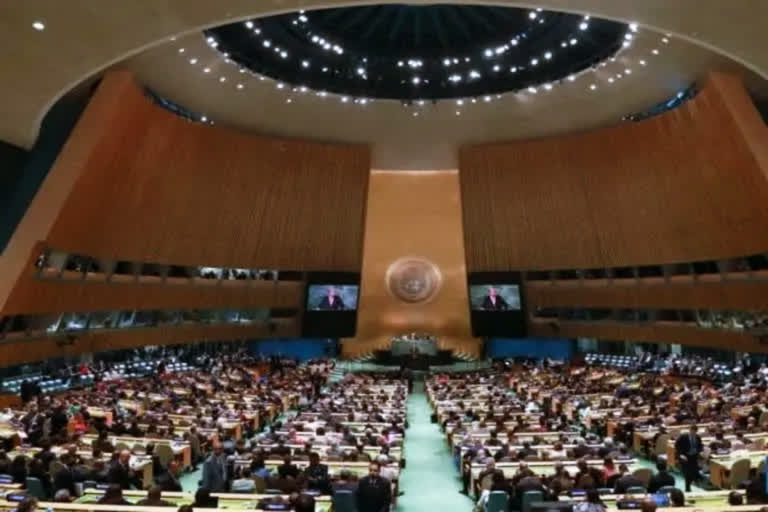United Nations: India abstained in the UN General Assembly on Thursday on a resolution that underscored the need to reach "comprehensive, just and lasting peace" in Ukraine, citing the resolution's "inherent limitations" in reaching New Delhi's desired goal of securing lasting peace and ending the conflict which has been raging for one year now.
India was among the 32 nations that abstained as the 193-member General Assembly adopted the resolution Principles of the Charter of the United Nations underlying a comprehensive, just and lasting peace in Ukraine, put forward by Ukraine and its supporters. The non-binding resolution, which received 141 votes in favour and seven against, underscored the need to reach, as soon as possible, a comprehensive, just and lasting peace in Ukraine in line with the principles of the Charter of the United Nations.
Before the UNGA vote, many countries, including the US, Germany and Ukraine, reached out to India seeking its support for the resolution that calls for Russia to end hostilities in Ukraine and demands the withdrawal of its forces. In the Explanation of Vote after the resolution was adopted, India's Permanent Representative to the UN Ambassador Ruchira Kamboj said that as the General Assembly marks a year of the Ukrainian conflict, it is important that we ask ourselves a few pertinent questions.
Are we anywhere near a possible solution acceptable to both sides? Can any process that does not involve either of the two sides, ever lead to a credible and meaningful solution? Has the UN system, and particularly its principal organ, the UN Security Council, based on a 1945-world construct, not been rendered ineffective to address contemporary challenges to global peace and security? Kamboj said.
Reiterating that India remains steadfastly committed to multilateralism and upholds the principles of the UN Charter, Kamboj stressed we will always call for dialogue and diplomacy as the only viable way out. While we take note of the stated objectives of today's resolution, given its inherent limitations in reaching our desired goal of securing a lasting peace, we are constrained to abstain.
She stressed that India continues to remain concerned over the situation in Ukraine, noting that the conflict has resulted in the loss of countless lives and misery, particularly for women, children, and the elderly, with millions becoming homeless and forced to seek shelter in neighbouring countries. Reports of attacks on civilians and civilian infrastructure are also deeply concerning, she added.
The resolution called upon member states and international organisations to redouble support for diplomatic efforts to achieve a comprehensive, just and lasting peace in Ukraine, consistent with the Charter. Kamboj termed as understandable the overall objective of the resolution seeking lasting peace in line with the UN Charter. We also note the emphasis on increasing support by member states for diplomatic efforts to achieve peace, as well as support for the Secretary General's efforts to promote a comprehensive, just, and lasting peace in Ukraine. However, reports from the ground portray a complex scenario, with the conflict intensifying on several fronts, she said.
General Assembly resolutions are not binding unlike the Security Council resolutions and carry mainly symbolic weight at the United Nations. Since Russia's February 24, 2022 invasion of Ukraine, several UN resolutions - in the General Assembly, Security Council and Human Rights Council, have condemned the invasion and underlined the commitment to the sovereignty, independence, unity and territorial integrity of Ukraine. The General Assembly has met in this Emergency Special Session on Ukraine six times in the past year.
India, which maintains good relations with Russia, has abstained from the UN resolutions on Ukraine and consistently underlined the need to respect the UN Charter, international law and the sovereignty and territorial integrity of states. New Delhi has also urged that all efforts be made for an immediate cessation of hostilities and an urgent return to the path of dialogue and diplomacy.
Kamboj said that New Delhi has consistently advocated that no solution can ever be found at the cost of human lives. She said that in this context, Prime Minister Narendra Modi's statement that this cannot be an era of war bears repetition and underlined that escalation of hostilities and violence is in no one's interest. Instead an urgent return to the path of dialogue and diplomacy is the way forward, the Indian envoy said.
India's approach to the Ukraine conflict will continue to be people-centric. We are providing both humanitarian assistance to Ukraine and economic support to some of our neighbours in the Global South under economic distress, even as they stare at the escalating costs of food, fuel, and fertilisers, which has been a consequential fallout of the ongoing conflict, she said.
India stressed that it is unfortunate that as the trajectory of the Ukrainian conflict unfolds, the entire Global South has suffered its unintended consequences. It is critical that the voice of the Global South be heard and their legitimate concerns are duly addressed, it said. Before the draft resolution was put to vote, the General Assembly considered two amendments to the resolution proposed by Belarus. The amendments failed to get adopted as over 90 member states voted against and over 50 nations abstained from each. India abstained from both amendments. The draft amendments and the resolution needed a 2/3 majority of those present and voting to be adopted. (PTI)



